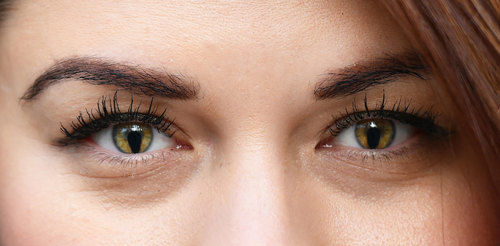
Is it possible to do a genetic test for colobomas?
August 5, 2004

- Related Topics:
- Rare events,
- Appearance,
- Eye color,
- Genetic testing
A graduate student from Texas asks:
“Hi. I am 25 yo female with bilateral colobomas and was wondering about what causes it and whether genetic tests are available. The outward appearance of my eyes is “weird” to most. I conceal the look by wearing special contact lenses which are hand painted. They create a normal facade of the eyeball itself making the deformity quite difficult to spot at times. I have light perception in my right eye, and decent vision in the left eye. Is there any test that can be done to test the fetus to determine if this has indeed been passed on?”
From what I've read, colobomas can be passed down through the generations but not always. When a coloboma is referred to as congenital, it means that it was present at birth; it does not mean that it is necessarily genetic. While what they are is pretty well understood, where colobomas come from is not. What this means is that it is not always possible to do a genetic test for colobomas.
The human eye develops between the 4th and 15th week of pregnancy. Colobomas are usually the result of the eyeball not fusing properly in the 4-6 week stage of embryo development. This results in a slit or gap in the eye.
There have been links to a number of genes including PAX6 and sonic hedgehog, but these explain only a small portion of colobomas.
Another possible cause is chromosomal abnormalities. What this means is that some part of a chromosome is missing or duplicated. (The best known example of a chromosomal abnormality is Down syndrome, which is caused by an extra chromosome 21.)

If either of these causes is the reason for a coloboma, then there is a chance it can be passed on. Even if colobomas do not run in the family, if the cause is a chromosomal abnormality that started with you, then it might be passed on.
It is important to keep in mind that not all colobomas are genetic. About 1/3 of cases are thought to be caused by environmental factors such as medications, pesticides, radiation, toxins or viruses like toxoplasmosis, rubella and certain strains of the flu virus.
Like other relatively rare conditions not much research has been done on colobomas. About 2/3 of cases appear to be genetic, but very few genes have been found. I would consider speaking with a genetic counselor if you want to find out more about your options.

Author: Dr. Barry Starr
Barry served as The Tech Geneticist from 2002-2018. He founded Ask-a-Geneticist, answered thousands of questions submitted by people from all around the world, and oversaw and edited all articles published during his tenure. AAG is part of the Stanford at The Tech program, which brings Stanford scientists to The Tech to answer questions for this site, as well as to run science activities with visitors at The Tech Interactive in downtown San Jose.
 Skip Navigation
Skip Navigation
